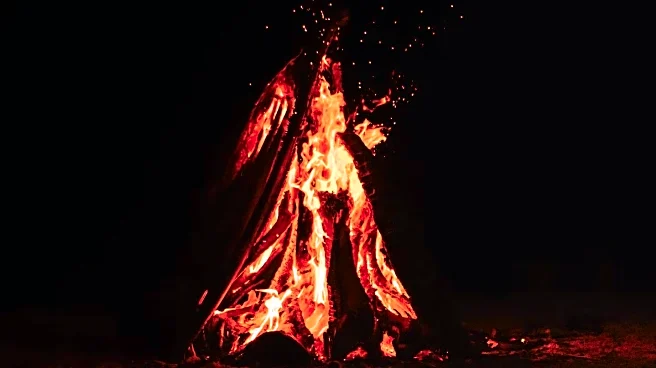What's Happening?
A woman attending the Burning Man festival in Nevada unexpectedly gave birth to a baby girl, weighing 3 lbs 9.6 oz, on Wednesday morning. The mother, who was unaware of her pregnancy until she went into labor, was assisted by nearby medical professionals, including an obstetrician and a pediatric trauma nurse. The baby, dubbed 'Citizen Zero' by festival attendees, is currently in the NICU gaining strength. The family, unprepared for the birth, faces financial challenges due to medical bills and travel expenses. Cryptic pregnancies, where women discover they are pregnant late into the term, occur in about 1 in 500 cases, often among young mothers or those with health conditions masking symptoms.
Why It's Important?
The unexpected birth highlights the phenomenon of cryptic pregnancies, which can have significant implications for maternal and child health. Such cases may lead to unpreparedness for childbirth, impacting the family's financial and emotional well-being. The event also underscores the need for awareness and education about pregnancy symptoms and health care access, especially in unconventional settings like festivals. The occurrence at Burning Man, a festival known for its focus on community and self-expression, brings attention to the diverse experiences of attendees and the importance of medical readiness in large gatherings.
What's Next?
The family is currently seeking financial support through a GoFundMe campaign to cover NICU care and other expenses. The baby will remain in the hospital until she is strong enough to go home. This incident may prompt discussions on improving medical facilities and emergency preparedness at large events like Burning Man. Additionally, it could lead to increased awareness and support for families experiencing cryptic pregnancies, encouraging better prenatal care and education.
Beyond the Headlines
The birth at Burning Man may influence perceptions of the festival, known for its artistic and self-reliant ethos, by highlighting the human and familial aspects of its attendees. It raises questions about the balance between festival culture and the practical needs of participants, including health care access. The event could also spark conversations about the societal understanding of cryptic pregnancies and the support systems available for unexpected births.











